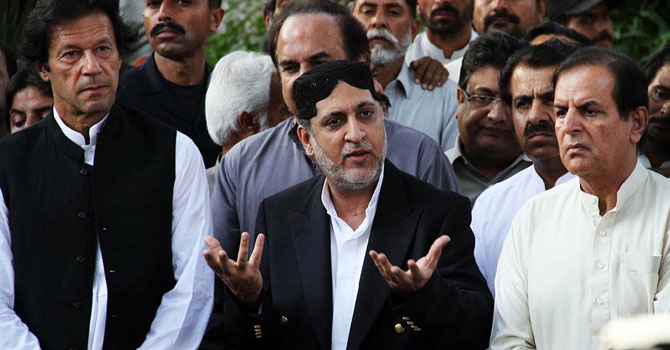
“I have no faith in our killers. I have no expectations from the institutions that have spilt the blood of our young, or shed the tears of our mothers and sisters. I expect little – or nothing – to change,” said a visibly exhausted Akhtar Mengal, the leader of the Balochistan National Party-Mengal, late Saturday night at Islamabad’s Balochistan House to Dawn.
For a man who just completed a four-day trip to Islamabad – visiting the Supreme Court’s law and order hearing on Balochistan, giving numerous interviews to national TV channels and newspapers, and holding joint press conferences with major political leaders – Mengal seemed especially sombre about the purpose and outcome of his meetings.
Even media appearances with the likes of Nawaz Sharif of the Pakistan Muslim League-Nawaz (PML-N), Syed Munawar Hasan of Jamaat-i-Islami (JI) and Imran Khan of the Pakistan Tehrik-i-Insaaf (PTI) received tentative reviews from Mengal. “I appreciate the sympathy and solidarity that political parties have shown. But they will have to clearly point out who is behind Balochistan’s problems, whether they are ready to stop – and twist – these people’s hands, and, most importantly, whether they are ready to punish the perpetrators. Sympathy and solidarity is not enough – we need practical results now,” said Mengal.
Mengal’s visit – and his now sombre tone – has raised a key question: If Mengal never believed that he could make a difference, why did he bother to come?“I came to do my part,” Mengal answered. “There are certain people who have been wondering whether a political solution can work. Well, now I have tried. The ball is in their court now. If they want to play fair we are ready to play fair. [But] if they want to kick the ball in our face, [then they should remember that] we have faced this ball not once, not twice, but five times,” said Mengal, referring – among other – to what the Baloch see as the 1948 annexation of their province; the 1958 betrayal by General Ayub Khan, when he promised guerrilla leader Nawab Nouroze Khan Zarakzai a safe return, only to hang his son and five others; and the 1973 military operation by Zulfikar Ali Bhutto, when 80,000 troops joined Iranian pilots in F-14 fighter jets to crush the third Baloch uprising.
Diplomacy or betrayal?
If Mengal is taken on face value, his concerns that nothing would change does not negate his decision to show up in Islamabad. For Mengal, the decision was a part of a “final stand” with the central government, at a point where the situation is coming to a head. Hundreds if not thousands have gone missing, bodies of young Baloch – many in their early 20s – continue to be dumped, and their bodies remain unrecognisable, after repeated torture by their kidnappers.“Elections will become selections if we hold them in the war-zone that has become Balochistan,” says Mengal, stopping short of declaring an all-out boycott if the situation remains the same.
But Mengal’s nationalist – and separatist-inclined counterparts in Balochistan disagree, arguing that Mengal should have stayed out of Islamabad altogether.
“I think Akhtar made the biggest mistake of his political life. No one will listen to him, no one will care,” said Dr Hakeem Lehri, a member of the Central Committee in Bugti’s Balochistan Republican Party, to Dawn. Lehri believes Mengal legitimised state institutions that have been persecuting the Baloch by visiting Islamabad.
The now exiled and former leader of Opposition in the Balochistan Assembly, Kachkol Ali Baloch, said Mengal had caused “irreparable damage” to the Baloch nationalist movement. And there is little indication that Khair Bakhsh Marri, Brahamdagh Khan Bugti and Dr Allah Nazar will develop trust in the state establishment. All of them are critical of Mengal’s move and have major support in the areas where both the uprising and the violence is at its peak, namely Kohlu, Dera Bugti and the Makran Coast.
According to US-based Malik Siraj Akbar, the Editor of the banned Baloch Hal, the Provincial Minister for Mines and Minerals Abdul Rehman Mengal and Member of the National Assembly Usman Advocate are BNP-M sympathisers who have failed to challenge establishment policies, indicating that Mengal is also ready to bend over to gain access to power, and that nothing substantial will change. Akbar is also critical of Mengal’s meetings with opposition leaders.
“He has even forgiven Nawaz Sharif, who ousted him in 1998,” said Akbar, pointing to what he sees as Mengal’s politicking to woe major opposition parties with influence in the Punjab before he lines up to gain access to power.
The Khan of Kalat, Mir Suleman Dawood, went as far as accusing Mengal of brokering a deal with the security establishment to further his political career. “No one can return to Pakistan without making a deal,” said Dawood in an interview with a private news channel, reports Baloch Hal.
“I know what everyone else says. But we have a clear position. We believe in democracy and the unity of Pakistan, and that is why I am here,” said Mengal.
“But even I must admit the situation is becoming untenable. I do not believe in fantasies. I do not think the establishment will stop its operations just because I ask them. I have come here to increase pressure on them via this country’s civil society and its political parties, and will have to wait and see what happens,” said Mengal.












































